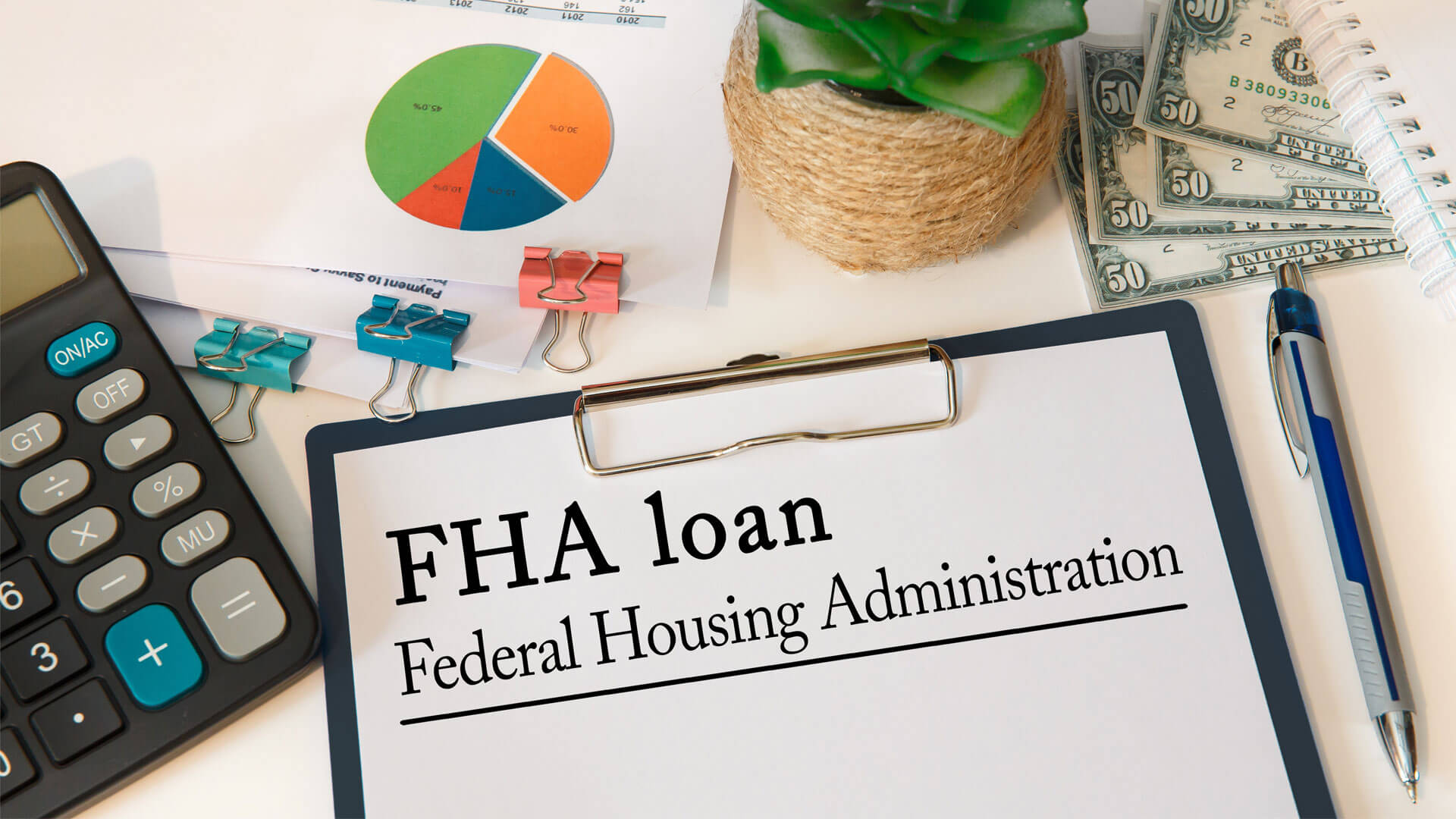Are you ready to buy a home but wonder if you can qualify for a loan? The FHA program could be a perfect fit for you. FHA loans are insured by the US Federal Housing Administration, which is part of the Department of Housing and Urban Development. The FHA home buyer loan program has been a staple in American home financing for 90 years.
What Do I Need to Qualify for a FHA Home Loan?
These FHA loans are designed for people with limited or lower credit scores who might not otherwise qualify for a mortgage. Learn all about FHA home loans in this article, then speak to a HUD lending adviser about taking the plunge into home ownership and the American dream.
- Minimum credit score of 500
- Debt-to-income ratio of 50% or lower (comparing your debt to your income)
- 3.5% down payment required for credit scores of 580 or higher
- 10% down payment required for credit scores between 500 and 579
- Property must be your primary residence and meet FHA’s property standards
Understanding the FHA Home Loan Program
FHA home loans have been a valuable financing programs for over fifty years because the qualifications are reasonable and the pricing is affordable. FHA loans are a good fit for many first-time borrowers who have average or poor credit and limited money for a down payment. This type of loan only requires a 3.5% down payment and a 580-credit score.
The FHA operates under the umbrella of the U.S. Department of Housing and Urban Development (HUD), providing a government guarantee for FHA loans. The U.S. Congress sets the FHA loan limits every year as well. This setup reduces risk for banks, brokers and lenders, as the FHA insures the loan rather than directly offering financing to the public.
FHA loans are particularly advantageous for first-time homebuyers, offering greater accessibility compared to Conventional loans. This broad accessibility makes FHA loans a popular choice among various borrower profiles.
Featuring lower down payment requirements, less stringent credit criteria, and potential financial aid options, FHA loans extend eligibility to homebuyers across diverse financial circumstances.
You may be able to qualify for an FHA loan even if you cannot qualify for a conventional mortgage. Note that the US government doesn’t issue these loans, but it does back them in case of default, which is why that you can often get a low rate when you choose an FHA home loan.
FHA loans are mortgages backed by the Federal Housing Administration (FHA), a division of the U.S. Department of Housing and Urban Development (HUD). While private lenders and banks provide these mortgages, the FHA provides insurance for the loans.
The most common terms for FHA financing is 15 and 30 years, but ask about the 40-year mortgage loan. There are unique requirements for a mortgage with 480 monthly payments, so ask an experienced FHA loan officer about your eligibility.
FHA loans are issued by private mortgage lenders, including brokers, credit unions, and banks. FHA loans can be used to buy a single-family home, condominiums, and multifamily homes with two to four units. But you need to live in the home to qualify for the loan.
You also can pair the FHA loan with a 203k loan which allows you to renovate the property. The 203K loan can be secured as a first or second-mortgage.
Why an FHA Loan vs. a Conventional Loan?
People with higher incomes and better credit often choose conventional loans because they can afford to put more money down and get the best interest rate. If you put down at least 20%, you also do not have to pay for mortgage insurance. More differences between FHA and conventional loans:
- Credit history: The big advantage of FHA home loans is you can get approved with a relatively low credit score, assuming your current payment history is steady. If you had past credit problems but are getting back on your feet and can pay your bills now, FHA loans could be for you. 580 is the minimum FHA loan credit score for 3.5% down, and 500 is the minimum for 10% down. If your score is in the 500s, you may need to shop more for a lender who will approve you.
- Mortgage insurance: All FHA loans require mortgage insurance, and you may need to pay it for the life of the loan. With a conventional loan, you don’t usually need mortgage insurance with 20% down.
- Gifts for the down payment: If you don’t have enough for a down payment, you can receive a gift from a family member for an FHA home loan. Some conventional loans have stricter rules in this regard.
- FHA appraisal: The home must be appraised by FHA if you get an FHA home loan, and it’s different from a conventional home inspection.
FHA Home Financing Advantages
- Minimal down payments starting from as little as 3.5% of the home’s purchase price
- Affordable closing costs on FHA loans
- Lower minimum credit score requirements vs conventional loans
- Increased debt-to-income ratio tolerance vs conventional mortgages
FHA Home Financing Disadvantages
- Additional expenses with an upfront mortgage insurance premium (MIP) of 2.25% of the loan’s value.
- FHA sets maximum limits for qualifying home prices
- FHA interest rates may be slightly higher at times than those for conventional home financing due to relaxed borrower eligibility criteria
Updated FHA Loan Requirements
As noted earlier, FHA lending rules are more flexible than some conventional loans, but you still need to qualify. The minimum for 3.5% down is 580 credit score and 500 for 10% down. But lenders are allowed to set higher standards for their businesses if they want. For example, one lender may require a 620 score and another a 580 score. Lenders also have flexibility to set their own fees and rates, so check with several lenders to see who offers the best deal.
Debt-to-income (DTI) ratio is also important for qualifying for an FHA loan. The DTI measures your debt payments each month compared to your gross. This includes your rent or mortgage expenses, as well as credit cards, student loans and auto loans. Generally, the lower your DTI, the better chances of being approved for your loan. DTI standards for FHA loans differ according to your FICO score and other factors, including how much money you have in savings.
If your credit score is between 500 and 579, FHA will probably want a DTI of under 43%. You might be able to get an FHA loan with a 50% DTI, but you will probably need to have money in the bank, and fewer lenders will qualify you.
Regarding down payment, the minimum for a 580 credit score is 3.5%. You need to put down 10% for a credit score below that. But not all of the money needs to come from your savings account. You can have a relative or friend gift you the money. All you need is a letter with their contact details that says what your relationship is and that the money is a gift. Learn more about FHA with their resources online.
Let’s Examine the FHA Loan Requirements for Home Buyers in 2024.

FHA-insured mortgages offer flexible lending terms, but not all applicants will meet the criteria for approval. Here’s what you should understand about qualifying for an FHA home buyer loan. You will need the following:
- Valid Social Security Number
- Meet the legal age requirement to enter into a contract in the relevant jurisdiction
- Have no bankruptcies within the preceding two years
- Have no history of short sales, foreclosures, or deeds in lieu of foreclosure within the past three years
Minimum credit score:
The minimum credit score is contingent on your down payment. If your down payment is 3.5% of the loan amount, the minimum credit score required is 580. However, a 10% down payment might qualify you with a minimum credit score of 500.
Minimum down payment:
For an FHA loan, the minimum down payment is 3.5% if your credit score is at least 580. If your credit score falls between 500 and 579, the minimum down payment increases to 10%. Additionally, you have the option to use cash gifts from friends, family, or employers toward your down payment.
Debt-to-income ratio:
Lenders evaluating your FHA loan application will assess your total debt compared to your income, known as the debt-to-income ratio (DTI). Typically, the DTI for an FHA mortgage is 43%. In certain cases, lenders may accept a DTI of up to 50%, but this is contingent on having excellent credit or a substantial amount of cash in savings. The key requirement is that you should comfortably afford your mortgage payments.
Income requirements:
FHA loans do not impose minimum income requirements, making them accessible to prospective homeowners across various income levels. Whether you are self-employed or employed part-time or full-time, FHA loans are available. Ideally, a consistent and stable job history of at least two years is preferable. Other sources of eligible income, such as child support and alimony, can contribute to meeting your requirements. The crucial aspect is to ensure you have sufficient income and cash flow to manage your monthly mortgage payments.
Documents typically required when applying for your FHA mortgage include:
- Current Pay-stubs
- Last 2 years of W2’s
- 12 month history of housing payments
- credit report
Do I need a FHA Home Loan Pre Approval?
If are serious about the home buying process, the FHA home loan can be an important component to get your offer accepted from a Seller. The initial step towards securing financing is to seek loan pre-approval. If you meet the prerequisites for FHA loans, you can proceed to apply online and obtain FHA loan pre approval and prequalification for an FHA home loan program. For decades, first time home buyers have been benefitting from competitive FHA terms and pricing that facilitate their goal of homeownership.
Smart Lending connects you with seasoned loan professionals adept at assisting you in obtaining FHA loan preapproval. These FHA financing pros can guide you through the process, explaining the guidelines and requirements to get approved for FHA financing confidently.
Obtaining a FHA home loan pre-approval is similar to the process of securing prequalification for home loan from a conventional lender. Nevertheless, there are a few additional criteria to bear in mind as you initiate the FHA preapproval procedure.
FHA Appraisal
The property you want to buy needs to be appraised by an appraiser approved by the agency to ensure it meets their minimum standards. The FHA appraisal is a separate process from a home inspection. FHA wants to make sure the home is worth enough for them to lend money on it, and they want to protect your interests, too.
You also may qualify for an FHA 203k renovation loan to fix it up. If you go that way, you will need an initial FHA inspection followed by a post-construction appraisal to estimate the value when it is finished.
Mortgage Insurance and FHA MIP
FHA backs the loan, which allows people with lower credit scores and down payments to get into the home. But you need to pay FHA mortgage insurance, usually for the life of the loan. You will make an upfront mortgage insurance payment that may be rolled into the loan. Then, you make monthly insurance payments as part of your loan payment. If you paid less than 10% down, the insurance is for the life of the loan. If you paid 10% or more, you pay for insurance for the first 11 years.
FHA home buyer loans require borrowers to pay both an initial mortgage insurance premium and a recurring monthly premium, serving to safeguard the lender in case of borrower default. While conventional loans may necessitate private mortgage insurance (PMI) when the borrower provides less than a 20% down payment, FHA loan guidelines mandate mortgage insurance regardless of the down payment amount.
The fee you’ll incur varies based on your loan size. The initial MIP amounts to 1.75% of the loan amount, payable in full at closing or rolled into the loan balance.
The monthly MIP is contingent upon factors such as your loan amount, down payment size, and loan duration.
FHA Refinance Loans
If you have a loan currently and want to move into an FHA loan, there are options available. You also can use one of these options if you have a current FHA loan:
- FHA rate and term refinance: If you have an FHA loan now and want to refinance you mortgage for a lower rate, this one is for you. You also can use it to shorten the loan term.
- FHA streamline refinance: This is a faster way to refinance an FHA loan without any appraisals.
- FHA cash-out refinance: This will replace your current first mortgage and give you some of your equity in cash.
Takeaway on FHA Home Mortgages
An FHA loan program is a government-insured option designed to ensure fair and competitively priced homeownership opportunities. It features lower credit score and down payment requirements compared to many conventional loans, enabling lenders to extend mortgages to individuals with higher risk profiles. This can result in increased approval rates and lower FHA interest rates for a broader range of borrowers.
Additionally, FHA loans may present lower closing costs compared to conventional mortgage loans. If obtaining a competitive mortgage is challenging due to your credit score or down payment, exploring an FHA home buyer loan could be a suitable option for your next home purchase.
Make sure to explore options from multiple government approved lenders that specialize in FHA, as each may have distinct requirements and mortgage rates can differ among brokers, even for identical home finance programs. FHA home loans are an excellent option for those with lower down payments and credit score, so speak to your FHA mortgage lender today to apply!



